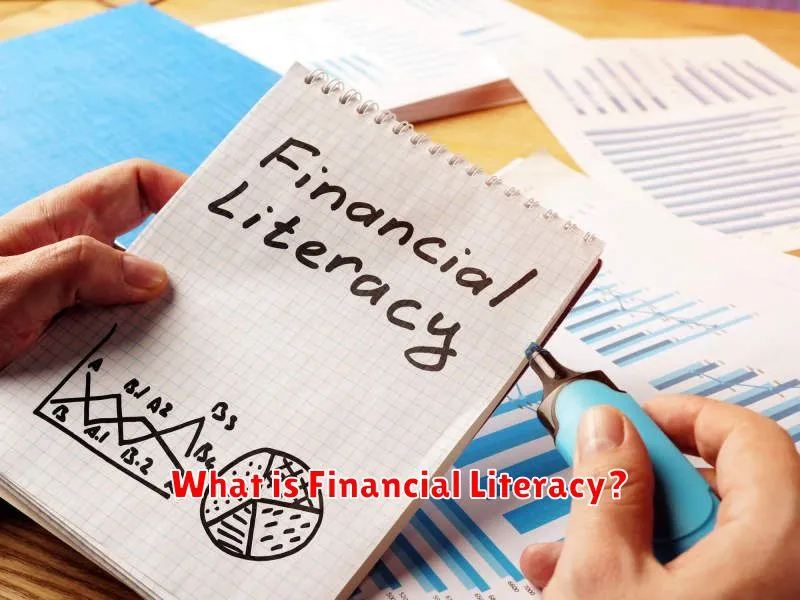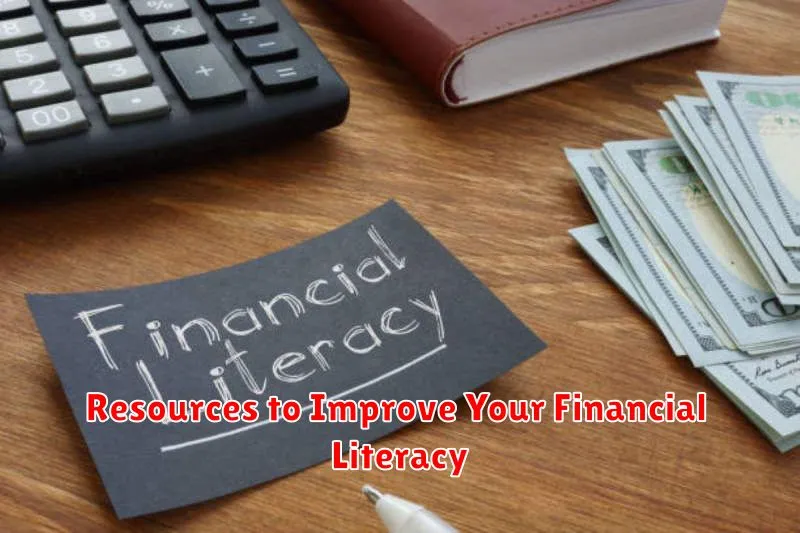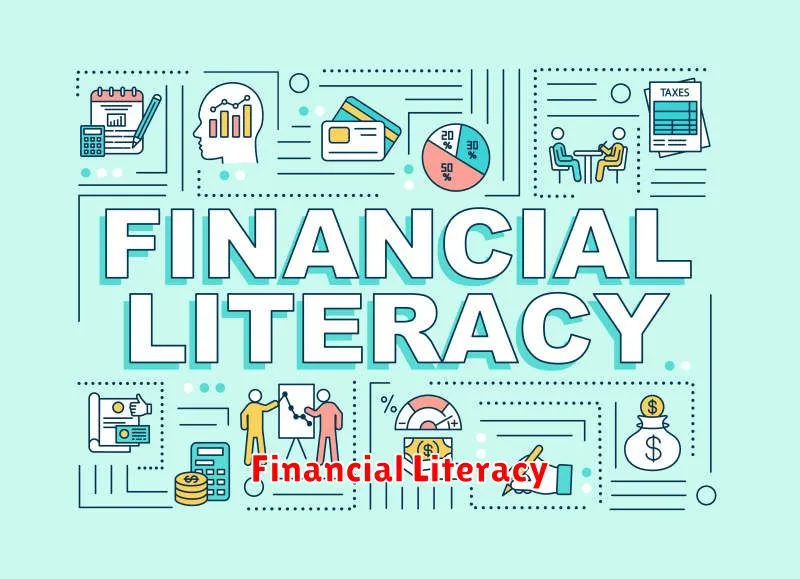In today’s complex financial landscape, financial literacy is no longer a luxury—it’s a necessity. Understanding how to manage your money, make informed financial decisions, and plan for the future can significantly impact your overall well-being and quality of life. Whether you’re just starting out or looking to enhance your existing knowledge, grasping key financial concepts is crucial for navigating the complexities of personal finance.
This article will delve into the importance of financial literacy and provide practical tips on how to improve yours. We’ll explore budgeting, saving, investing, managing debt, and more. By the end, you’ll be equipped with the knowledge and resources to take control of your finances and work towards a more secure financial future.
What is Financial Literacy?

Financial literacy is the ability to understand and effectively use various financial skills, including personal financial management, budgeting, investing, and understanding financial products like credit and loans. It’s about having the knowledge and confidence to make responsible financial decisions that help you achieve your goals.
More than just knowing financial terms, financial literacy is about applying that knowledge to real-life situations. It’s about feeling empowered to manage your money effectively, plan for the future, and navigate the complexities of the financial world.
Why Financial Literacy is Key to Personal Financial Success
Financial literacy is the foundation upon which you build a secure financial future. It’s about understanding and effectively using various financial skills, such as budgeting, saving, investing, and managing debt. This knowledge empowers you to make informed decisions about your money, leading to better financial outcomes and ultimately, greater financial success.
When you’re financially literate, you can control your finances instead of feeling controlled by them. You’re equipped to create a realistic budget that aligns with your goals, whether it’s saving for a down payment, investing for retirement, or achieving financial independence. You understand the time-value of money and how to make your money work for you through smart investments.
Furthermore, financial literacy helps you avoid common financial pitfalls. You’re less likely to fall victim to predatory lending practices or make impulsive financial decisions. You’re better prepared to navigate economic uncertainty and adapt to changing financial circumstances with confidence.
In essence, financial literacy provides the tools and knowledge to manage your money effectively, make sound financial decisions, and achieve your financial goals, paving the way for a more secure and prosperous future.
How to Start Your Financial Education Journey
Embarking on your financial education journey is a powerful step towards achieving financial well-being. It’s never too early or too late to start learning how to manage your money effectively.
1. Identify Your Starting Point: Begin by assessing your current financial knowledge. Are you familiar with basic financial concepts like budgeting, saving, and investing? Understanding your strengths and weaknesses will help you focus your learning.
2. Set Clear Goals: What do you hope to achieve through financial education? Whether it’s buying a home, saving for retirement, or simply gaining control of your finances, having clear goals will provide direction.
3. Explore Reputable Resources: Fortunately, there’s an abundance of resources available, both online and offline. Consider these options:
- Books: Explore personal finance classics or books tailored to your specific goals.
- Websites and Blogs: Many reputable financial websites and blogs offer valuable information and tools.
- Podcasts: Listen to financial experts discuss various topics while on the go.
- Courses and Workshops: Enroll in online courses or attend local workshops for a more structured approach.
4. Start Small and Be Patient: Financial education is a journey, not a race. Begin with one or two key areas that resonate with your goals and gradually expand your knowledge. Don’t feel overwhelmed; every step counts.
5. Take Action and Track Progress: Knowledge without action is futile. As you learn, implement what you’ve gained into your financial habits. Track your progress regularly to stay motivated and make adjustments as needed.
Remember, your financial education journey is unique to you. Embrace the process of continuous learning, and you’ll be well on your way to a brighter financial future.
Resources to Improve Your Financial Literacy

Enhancing your financial literacy is an ongoing journey, and a wealth of resources are available to support your progress. Here are some avenues to explore:
Online Courses and Workshops: Platforms like Coursera, edX, and Khan Academy offer a wide array of courses on topics ranging from budgeting and investing to retirement planning and debt management.
Financial Websites and Blogs: Reputable sources like Investopedia, NerdWallet, and The Balance provide articles, calculators, and tools to deepen your understanding of various financial concepts.
Books and Podcasts: Explore personal finance books by renowned authors or tune into podcasts hosted by financial experts to gain insights and practical advice.
Financial Advisors: Consider consulting with a certified financial advisor who can provide personalized guidance based on your specific financial goals and circumstances.
Government Agencies: Organizations like the Consumer Financial Protection Bureau (CFPB) offer free resources and educational materials on a variety of financial topics.
Remember, improving your financial literacy is an investment in your future well-being. By taking advantage of these resources, you can empower yourself to make informed decisions and achieve your financial aspirations.
Common Financial Terms Everyone Should Know
Having a basic understanding of common financial terms is crucial for navigating the complexities of personal finance. It empowers you to make informed decisions about your money, understand financial news, and engage in productive conversations with financial advisors. Here are some key terms everyone should know:
Budget: A plan that outlines your income and expenses over a specific period. It helps you track your cash flow, identify areas for saving, and avoid overspending.
Income: Money earned from various sources, such as salaries, wages, investments, or business profits.
Expenses: The costs you incur for goods and services, including necessities like rent, groceries, and discretionary spending like entertainment or dining out.
Net worth: A measure of your financial health, calculated by subtracting your liabilities (debts) from your assets (what you own). A positive net worth indicates you have more assets than debts.
Asset: Anything of value that you own, such as cash, investments, real estate, or personal property. Assets can appreciate or depreciate in value.
Liability: A financial obligation or debt that you owe to another party, such as a mortgage, student loan, or credit card balance.
Interest: The cost of borrowing money, typically expressed as a percentage of the principal amount. It can also refer to the earnings you receive on savings accounts or investments.
Investing: Putting your money to work to potentially grow your wealth over time. Common investment options include stocks, bonds, and mutual funds.
Retirement planning: The process of saving and investing money to ensure financial security during your retirement years. It often involves contributing to retirement accounts like 401(k)s or IRAs.
Credit Score: A numerical representation of your creditworthiness, reflecting your history of borrowing and repaying debt. A good credit score is essential for obtaining favorable interest rates on loans and credit cards.
The Role of Financial Education in Schools
Financial education in schools plays a critical role in equipping young people with the knowledge and skills necessary to navigate the complex world of personal finance. By introducing financial concepts early on, students can develop responsible habits regarding money management, budgeting, saving, and investing.
Integrating financial literacy into the curriculum, from elementary to high school, can empower students to make informed financial decisions throughout their lives. This includes understanding the importance of budgeting, the impact of debt, the benefits of saving and investing, and the responsible use of credit.
Moreover, financial education in schools can contribute to broader societal benefits. A financially literate population is less likely to make poor financial choices, leading to greater economic stability and reduced financial stress.
How to Teach Financial Literacy to Your Kids
Teaching your kids about financial literacy from a young age is crucial for setting them up for a secure future. Start with the basics, like explaining the value of money and the difference between needs and wants.
Practical Experience: Give your children opportunities to manage money themselves. Consider an allowance tied to chores, letting them choose how to spend or save their earnings.
Open Communication: Encourage conversations about money. Talk about family finances in age-appropriate ways, explaining budgeting decisions or saving goals.
Goal Setting: Help them set savings goals, like a new toy or a future experience. This teaches them to plan ahead and make choices about their spending.
Lead by Example: Kids often learn best by observing. Let them see you making thoughtful financial decisions, budgeting, and saving.

